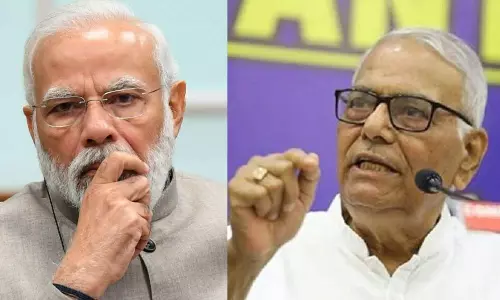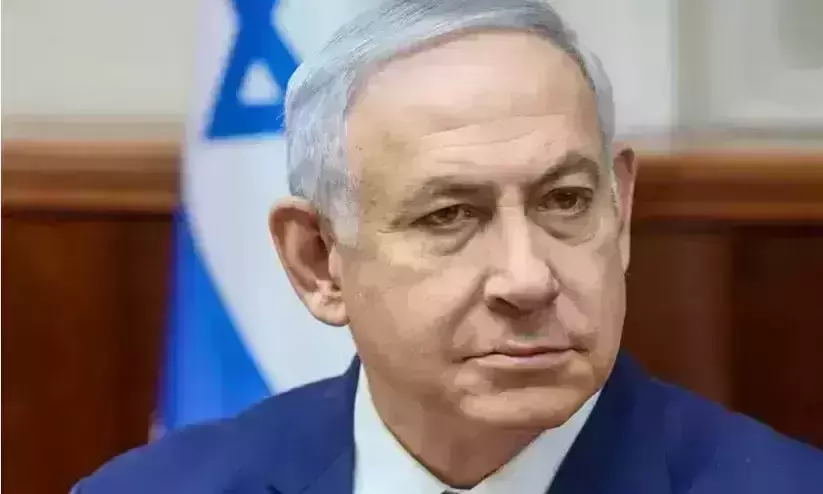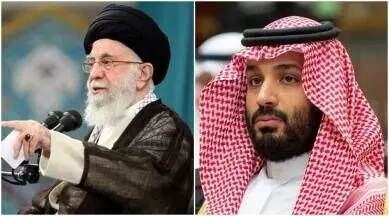
Netanyahu's castle cumbling
text_fieldsThe Saudi-Iranian agreement to resume diplomatic relations is wholeheartedly welcomed by Islamic countries and organizations. The reopening of embassies as mentioned in the agreement may take place within two months. It was an achievement of the Chinese sponsored talks held in Beijing. Saudi ànd Iran had severed their diplomatic relations in 2016 due to political reasons and ideological differences. However, now the disputes seem settled as the official IRNA news agency reported that as a result of talks between Ali Shamkhani, Secretary General of Iran's Supreme National Security Council, and Musaed bin Muhammad al-Aiban, Minister of State, Member of the Council of Ministers, and Saudi National Security Adviser, the two countries have agreed to resume diplomatic relations and reopen the two embassies within two months. But, the announcement, on the contrary, dashed Israeli hopes of forming a regional security alliance against Iran. The news of a rapprochement between Iran and Saudi Arabia was therefore greeted in Israel with surprise and anxiety. Prime Minister Benjamin Netanyahu who has been selling himself as the Israeli leader best qualified to fight Iran and most able to charm Saudi Arabia was caught off guard.
The Turkish Ministry of Foreign Affairs welcomed the Saudi-Iranian agreement and congratulated the two sides for "this important step taken by the two countries in line with the paths of softness and normalization that have prevailed in the Middle East for some time." It expressed confidence that the progress in relations between the two countries will contribute significantly to the security, stability and prosperity of the region. Qatari Prime Minister Sheikh Mohammed bin Abdul Rahman Al Thani welcomed the agreement and expressed similar sentiments of hope and optimism. Iraq and the Sultanate of Oman – the latter having acted as mediators to bridge views between Riyadh and Tehran - welcomed the agreement, stressing that it “will give a qualitative impetus to the cooperation of the countries of the region” and described it “a new page of diplomatic relations between the two neighboring countries.” Other Arab countries like UAE, Egypt, and Bahrain also welcomed the agreement as a positive step towards resolving differences and ending all regional disputes.
Role of China
Iran and Saudi Arabia have grown more aware of the imperativeness of a diplomatic resolution at this time and were more willing to do so, especially after the entry of China with its comprehensive strategic relations with the two parties. China played a significant role in bringing the parties of differing points of view closer together following years of protracted negotiations. Each of the parties found its own reasons for reaching this diplomatic agreement. Iran is now in need of easing the international isolation and further calm the situation inside Iran. The situation in Iran deteriorated due to the protests of the public after the death of the Kurdish girl Mahsa Amini and the demands of the people to overthrow the regime.
Iran also felt the danger approaching after the halt of nuclear talks with the US side. The Israeli threat of a possible military strike was looming over them. Israel has been trying to naturalize their relationship with the Gulf countries and exert increasing pressure on Tehran. Now, Tehran and Riyadh, both governments, however, have committed to observe the principles of the UN Charter, including respect for national sovereignty and non-interference in each other’s internal affairs. Though agreeable, it is not enough on its own. The agreement must be supplemented with additional commitments to ensure sustainable, friendly relations between Tehran and Riyadh. As the most powerful regional and Islamic states, they should commit to each other’s security as an integral part of their own; put an end to illusions about “regional hegemony” and work to create a system of cooperation and collective security among the eight countries bordering the Gulf; and convert their unhealthy competition in crisis-ridden countries such as Yemen, Syria and Iraq into a constructive partnership . In addition, they should foster effective regional and international cooperation against weapons of mass destruction, extremism and terrorism; treat the members of their religious minorities as full citizens; and work to de-escalate tension between Washington and Tehran.
Finally, Beijing - which also has strong diplomatic relationship with Iran and Israel - could potentially even mediate a ceasefire between them as they are in a quasi-war situation. Iran’s Supreme National Security Council secretary, Ali Shamkhani, just held talks to this effect with the crown prince of Abu Dhabi. And Qatar and Oman also have been actively mediating to revive the Iran nuclear deal and secure the exchange of prisoners between Iran and the US. China is reported to plan hosting an unprecedented summit later this year for Iran and its six Arab neighbors in the Gulf Cooperation Council. It is quite important to note that the official Saudi Press Agency reported on 23rd March 2023 that the Foreign Minister Prince Faisal bin Farhan Al Saud agreed, in a phone call with his Iraniancounterpart, Hussein Amir Abdullahian, to hold a bilateral meeting between them soon, in order to prepare the ground for the reopening of embassies and consulates in both countries. At any rate, the consolation is that Riyadh and Tehran have decided to bury the hatchet.
'Low-risk, high-impact' chance
China sees the Saudi-Iran détente as a “low-risk, high-impact” opportunity to establish its diplomatic and political credentials in West Asia. This is a region where China's economic stakes are high, and the normalization of relations between Saudi Arabia and Iran presents a unique chance for China to expand its influence in the area. With this move, China hopes to pitch as a key mediator in the region and a force to be reckoned with in global politics. China’s interest in the Saudi-Iran détente is largely driven by economic considerations. The region is home to some of the world’s largest oil reserves, and China is heavily dependent on such reserves to fuel its growing economy. The peace between Saudi Arabia and Iran has the potential to stabilize the oil market and ensure a steady supply of oil to China. In addition to oil, China also has significant investments in infrastructure projects in the region and is keen to protect these investments. The announcement of the resumption of Iranian-Saudi relations left a rapid impact on the currency market in Iran. The former Iranian central bank governor Abdolnaser Hemmati implicitly commented that Iran's agreement with the International Atomic Energy Agency and Saudi Arabia were two positive steps. He added, "International understandings and reducing tension gradually show their effects on lowering inflationary expectations, even on a holiday." It is a prerequisite for progress and development of the country. The way forward is not the push back by the two regional powers. In light of the new and complicated regional order – or rather disorder – the two nations must chart a new and sustainable path forward that serves their and their neighbors’ national interests. They should refrain from interfering in each other’s affairs, wasting fortunes on undermining other Middle Eastern societies, and in the process, engaging in a costly arms race. Like other nations, the people of Iran and Saudi really want their leaders to focus their attention on domestic affairs, not foreign bravados, pursuing democratic harmony at home instead of spreading anarchy abroad. A new way forward is an opportunity to lower tension, mitigate the damages, and compensate neighbors for the harm done to them. It is indeed morally incumbent upon the two oil-rich nations to help Syrians, Yemenis and other victims of proxy conflicts rebuild their shattered lives.
Riyadh-Teheran axis
Indeed, Riyadh and Tehran must now take a determined common stand on Western support for Israel’s colonialism and apartheid – predictably the only country that openly opposes the new Gulf détente, which it is, no doubt, determined to sabotage it. For Netanyahu, the agreement was quite a surprise ! In a speech to American Jewish leaders last month, Netanyahu hinted that a peace agreement with Saudi Arabia was taking shape and also he was working in parallel with the goal of stopping Iran's nuclear experiment. Now, experts say the Saudi-Iran deal has thrown cold water on those ambitions. Saudi Arabia’s decision to engage with its regional rival has left Israel high and dry and will poase a challenge to the unilateral military strike it plans against Iran’s nuclear facilities. The UAE also resumed formal relations with Iran last year. The agreement that re-establishes ties after seven years of rupture, anyway, broadly represents one of the most striking shifts in Middle Eastern diplomacy . In countries like Yemen and Syria, long caught between the Sunni kingdom and the Shiite powerhouse, the announcement stirred cautious optimism while it caused disappointment in Israel.
Netanyahu’s greatest foreign policy triumph was Israel’s U.S.-brokered normalization deal in the "Abraham Accords" in 2020 with four Arab states. It was part of a wider push to isolate and oppose Iran in the region. He portrayed himself as the only politician capable of protecting Israel from Tehran’s rapidly accelerating nuclear program and its regional proxies, like Hezbollah in Lebanon and Hamas in the Gaza Strip. Israel and Iran also waged a regional shadow war that led to suspected Iranian drone strikes on Israeli-linked ships ferrying goods in the Persian Gulf, among other attacks. With a deal with Saudi Arabia, the most powerful and wealthy Arab state, Netanyahu intended to fulfill a prized goal of reshaping the region and boosting Israel’s stance in historic ways. However, the kingdom has now declared that it won’t officially recognize Israel before a resolution to the decades-long Israeli-Palestinian conflict. “It’s a blow to Israel’s notion and efforts in recent years to try to form an anti-Iran bloc in the region,” said Yoel Guzansky, an expert on the Persian Gulf at the Institute for National Security Studies, an Israeli think tank.
Peace prospects in Middle East
In fact, the regional rivalry between Saudi Arabia and Iran used to define most of the conflicts that raged in the Middle East since 2011. It led to the humanitarian catastrophe in Yemen due to the war that broke out between the Houthi militia loyal to Iran and the forces of tribes loyal to the Yemeni government in 2015. It also caused chronic instability in Iraq, ignited a protracted crisis in Lebanon, and, along with other factors, prevented a negotiated political solution to the conflict in Syria. Actually, in these conflict-ridden countries, it is the rivalry between Saudi Arabia and Iran that threatened the security and stability in the Gulf region . The effectiveness of the security guarantees that the United States promises to its Arab allies is quite limited. Often the Houthis, Iran's allies, launched drone and missile attacks on oil installations and other strategic sites in Saudi Arabia. And if this agreement, brokered by China, is implemented in good faith - and there is no reason to presume otherwise - then the Gulf region can be expected to reap direct and rapid gains, and the chances of achieving long-term positive results will increase.
The hope is that transformation of the current truce will help Yemen achieve a permanent peaceful solution. That may facilitate gradual political detente in both Iraq and Lebanon, paving the way for Syria's return to the Arab League. Further, it may help Iran and the Gulf states seriously negotiate security arrangements.On all these levels, Chinese mediation and the agreement between Saudi Arabia and Iran do open the doors of cooperation and strategic partnership among the countries in the Middle East.
Now, at the time of writing these lines, Netanyahu witnesses a complete paralysis of life in Israel, in the wake of the general strikes in the fields of commerce and transport. Since the morning hours, Ben Gurion International Airport, Haifa and Ashdod ports were closed, and work in factories and workshops stopped, and workers and employees have gathered in the streets .Thousands of people are around the Knesset (parliament) building, as part of the protests against the government's plan to overthrow the judicial system of government. An unprecedented political crisis is afflicting Israel. What began as protests against the efforts of the far-right government to pass controversial judicial reforms has swelled to a level that is described within the Hebrew state as threatening to escalate into civil war.



























